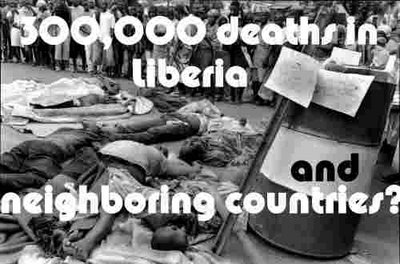Did Royal Caribbean and Celebrity Cruise Lines Help Finance Death and Destruction in Africa?


The fighting also left at least 850,000 displaced from their homes and another 700,000 had become refugees in neighboring countries. That's out of a prewar population of 2.5 million to three million. Child soldiers roamed the countryside, numb from years of violence.
Royal Caribbean and Celebrity Cruise Lines operate cruise ships that are registered or flagged in Liberia. This practice is known as flying a "Flag of Convenience" * and, although legal, it is generally associated with unethical practices and murky financial practices. The perennially war-torn West African nation of Liberia, for example, has operated a flag registration since 1948 and now boasts a merchant fleet that is more than three times the size than that of the United States. Royal Caribbean is also incorporated in Liberia. Liberia's shipping registry was tied conclusively to UN sanctions busting in October of 2001, when a US panel of experts revealed that registry funds had gone directly to pay for arms purchases and transport. The Liberian Corporate and Maritime Registries provide an important source of revenue to a poor country. The maritime registry is of international repute but it is vulnerable because of the use of the funds it generates for opaque off-budget expenditure including for sanctions-busting. Critics have also claimed that companies used Liberian registry to conceal diamond smuggling and tax evasion. That same report described Liberia's Bureau of Maritime Affairs as "little more than a cash extraction operation and a cover for sanctions-busting".
The panel was set up by the U.N. Security Council to investigate the effectiveness of a ban on arms sales, an embargo on Liberian diamond exports, and a travel ban on Liberian President Charles Taylor and top associates. Liberia has been accused of fueling the civil war in neighboring Sierra Leone by supporting that country's rebels in a gems-for-arms trade, partly to enrich some officials.
Liberia wants ex-president Charles Taylor for war crimes Last
Fri, 17 Mar 2006 11:08:23 EST CBC News
Liberia has formally asked Nigeria, where Taylor has lived since 2003, to extradite him, news services reported on Friday. A tribunal in Sierra Leone wants to try him for selling diamonds and buying weapons for a rebel group that was notorious for hacking off civilians' arms and legs, the BBC reported. During his reign, thousands of people were reportedly mutilated at the hands of Taylor's soldiers as part of their extortion rackets. 01 Apr 2006 20:21:24 EST CBC News
Taylor's commanders would force boys to kill their parents or other family members, breaking the ultimate taboo, then ply them with methamphetamines, marijuana and other drugs to keep their killing instincts keen. Often their pay came in the form of a license to rape and plunder. Yet even as he undermined traditional respect for elders, he subtly substituted himself in those elders' place, simultaneously enthralling and enslaving a generation of young boys who slaughtered on his behalf. This explains his supporters' chilling election campaign cry in 1997: "He killed my ma, he killed my pa, I'll vote for him." Mr. Taylor also co-opted the secret societies that dominate life in many West African countries, like the Poro hunting society in Liberia. This gave him access to a world of unseen power and allowed him to project an aura of mystery and invincibility. Rumors that he practiced cannibalism, human sacrifice and blood atonement rituals merely added to his mystique. Mr. Taylor also had plenty of money. In his hands, the Liberian state essentially became an adjunct to organized crime and terrorist networks that included Al Qaeda. Douglas Farah, an analyst and author who has written extensively about Mr. Taylor's links of criminal and terrorist networks said, "He ran this amazingly complex criminal enterprise where the state could provide critical things like diplomatic passports and airplane registration to a range of criminal networks."
NYT A Master Plan Drawn in Blood By LYDIA POLGREEN
Published: April 2, 2006
"The Liberian International Ship and Corporate Registry, is a contrivance that has masked thousands of questionable shipping and intelligence operations, banks, and corporations, including corporations involving arms smuggler Viktor Bout and Pat Robertson, through the International Trust Company in Monrovia."
In 1976, when George H. W. Bush was CIA Director, IRI/Liberian Services moved its headquarters to Reston, Virginia. IRI also maintains offices in New York; London; Pireaus, Greece; Hong Kong; Ft. Lauderdale, FL; Singapore; Shanghai; and Tokyo. The entity has long been rumored to be a CIA front, having registered ships owned by Greek shipping tycoon Stavros Niarchos and brokering deals involving George H. W. Bush's Zapata Off-Shore. All of Zapata Off-Shore's Securities and exchange Commission filings between 1960 and 1966 have been destroyed.The Carlyle Group, the corporate entity that replaced the Bush-influenced entities such as BCCI and savings and loan banks of the 1980s and the Enron slush fund of the 1990s, is rumored to have a major stake in Dubai Ports World outsourcing of port operations in the United States. Halliburton is also rumored to be a top contender to take over port operations from Dubai Ports World. George H. W. Bush has old business ties to Dresser Industries, which is now owned by Halliburton/Kellogg, Brown & Root
deepbutter.blogspot.com 3/12/2006 Intelligence report by Wayne Madsen
Charles Ghankay McCarthy Boye Dakphanna Taylor, the small man with many names, was last year described as the third most wanted war crimes suspect in the world -- after Saddam Hussein and Slobodan Milosevic, whose recent death has left a cell vacant for Taylor in The Hague. He made an unholy alliance with the U.S. televangelist Pat Robertson using the preacher's Operation Blessing planes -- which were supposed to be sending relief supplies to the victims of the genocide in Rwanda -- to haul diamond-mining equipment.
http://www.hamiltonspectator.com
* As long ago as 1958, the Organisation for Economic Co-operation and Development (OECD)defined Flags of Convenience as: "the flags of such countries as Panama, Liberia, Honduras and Costa Rica whose laws allow —and indeed,make it easy for —ships owned by foreign nationals or companies to fly these flags. This is in contrast to the practice in the maritime countries (and in many others)where the right to fly the national flag is subject to stringent conditions and involves far reaching obligations ". Under international law every ship must sail under a flag which gives its nationality to the ship. The flag State accepts responsibility for both the conditions on board and the activities of the ship. About 30 countries effectively rent their flag to shipowners of any nationality, guaranteeing the minimum of rules, regulations, taxes and interference. These flags are called ‘Flags of Convenience ’(FOCs). They make money out of their shipping register because they accept the fees, but do not effectively exercise any control over the ships in their fleet or the companies owning these ships,which would normally incur them
in expense. Under the FOC system, the registered owner of most ships is a ‘shell ’company set up for the sole purpose of owning that one ship. That registered owner is often,in turn,owned by another company which may itself be registered in a country with very liberal company laws. This setup, which works for companies, criminals and terrorists as well as shipowners, allows a shipowner the ability to disappear completely from any accountability which may be attached to him through owning the ship. If anything goes wrong,the company ceases to exist and no information is forthcoming on ownership. The secrecy and lack of transparency of the FOC system allows shipowners to ignore their responsibilities and cut their operating costs. As well as lax company laws and a lack of any meaningful regulation of the shipping or company operation, FOCs offer cheap registration fees, low or no taxes, and the freedom to employ cheap labour from any country. Industrialised and developing countries have both suffered as a result of the regime of tax havens and Flags of Convenience. The so far apparently fruitless search for Al Qaeda ’s ships illustrates the problems which this system has spawned.
In the 2001 Annual Report, the UK Marine Accident Investigation Branch (MAIB)chief Rear Admiral John Lang attacked the majority of flag States who have been unable or unwilling to conduct independent,in-depth accident investigations and make their reports publicly available. Admiral Lang blamed States'reluctance on the "lack of transparency in the international shipping community"and also highlights the climate of fear that is "prevalent throughout the industry". Mariners are genuinely frightened that if they were known to be reporting safety deficiencies,they would almost certainly lose their jobs,he commented. "This...is not conducive to the establishment of a safety culture at sea". He stressed that the issues of sub-standard shipping,under-manning and mariner fatigue were continuing. While he does not name any particular flag States, FOCs provide owners with secrecy concerning their commercial operations,and this is extended to casualty investigations which are not made public, and indeed in many cases casualties are not investigated at all.
Miami-based Royal Caribbean has agreed to pay record fines in recent years for illegal discharges and falsification of the oil record book. In 1999 the company pleaded guilty to 21 felony charges for dumping bilge water and chemicals,falsifying records and lying about it, and agreed to pay an $18m fine. More recently, prosecutors took Carnival Corp, the world ’s largest cruise operation, to court in Miami and in April 2002 secured $18m in penalties and a pledge that the company would overhaul procedures. This followed allegations that engineers on six cruise ships were dumping waste by fraudulently operating equipment and falsifying records.
We have, in practice, a non-functioning self-regulatory system. The use of FOCs and the ability to change flag at whim enables shipowners and ship operators to determine the the degree to which they will comply with internationally agreed minimum standards. The International Transport Workers ’Federation (ITF) believes that the maritime industry is suffering from regulatory failure due to the fact that many international standards lack an enforcement mechanism and therefore what is required is an agreed framework which ensures compliance. It is time for governments to confront the inherent problems of the shipping industry and for them to put in place an effective regulatory regime, which will be enforced,and which will restore rationality to the industry. It should ensure that the industry is run in a manner which is consistent with the concepts of sustainable development,both in terms of the ships and the seafarers who are needed to serve on them. A global industry needs the uniform application of all the provisions of international law, rather than selective application and the disregarding of those which it is politically or economically expedient to disregard.


0 Comments:
Post a Comment
<< Home